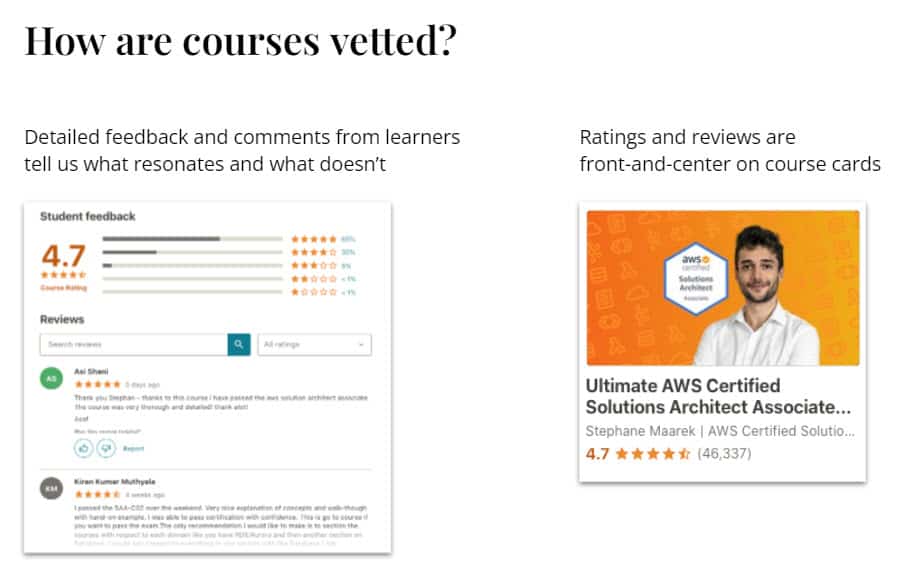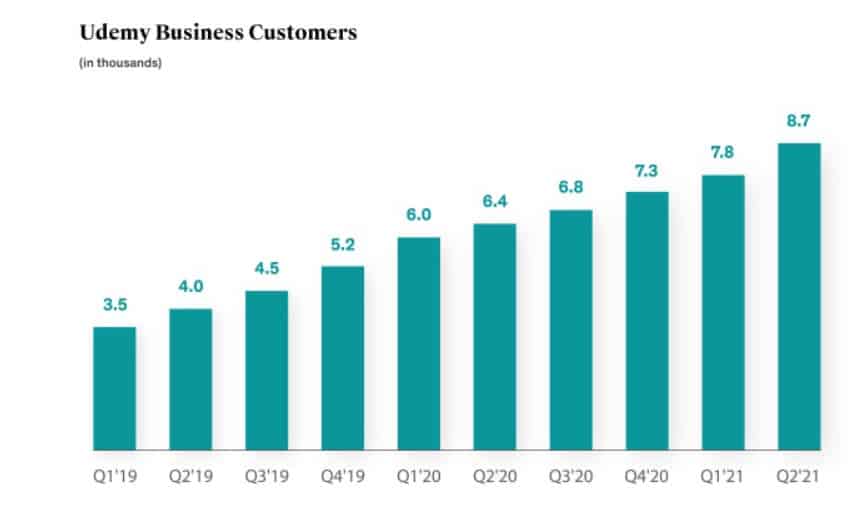Why Udemy Could Be The Hottest Company In Corporate Learning
The corporate training and skills development market is massive. Today it’s over $360 Billion and growing by almost 8% this year. Why the explosive growth? It’s simple: every individual, employee, and company is upskilling themselves for careers and growth.
For companies, the mandate is clear: the average company spends $1500 or more per employee each year, and big organizations like Walmart, Target, and Disney, are spending billions on tuition reimbursement and education benefits. Large, established companies like IBM, Deloitte, Cisco, and Accenture spend almost $4,000 per year per employee, and for leaders, it’s in the tens of thousands.
For individuals, the market is similarly huge. There are more than 2 billion workers around the world and as the price of training and certification goes down, the volume and spending goes up. So every university, for-profit college, and certification provider is offering useful career-enhancing courses at an ever-lower cost per hour.
Most of the vendors in this space are what I call “publishers.” They design courses, develop a compelling learning experience (often using video and collaboration), and they promote and sell the programs. So you can go to LinkedIn Learning, Coursera, Pluralsight, O’Reilly, and dozens of other places and take courses in web design, cloud engineering, cyber security, and more. For management and leadership programs you can go to Harvard Publishing, most university business schools, and lots of other providers. (Including our own Josh Bersin Academy.)
But all these companies have one problem. They are limited in the range of courses they offer. If you want, for example, a brand new training program on NFTs or the Metaverse, you probably have to go to YouTube and poke around. And if you are an expert and want to teach others, you probably have to build your own platform and take the risk that nobody may come.
What if there was a “Creator Platform for Corporate Learning,” and you had a tool as easy to use as TikTok (which is now a $60 Billion company) or Instagram to teach?
Enter Udemy: the ultimate creator platform: a place you can go to build the best content and make sure everyone can use it.
How Did Udemy Get Here?
Udemy started life in 2010 as a learning marketplace to let people build and publish their own courses. At first, it wasn’t clear whether it would work.
But over time the company grew its consumer platform, built and scaled its corporate offering, added amazing analytics, hired a sales force, and developed a comprehensive taxonomy for all areas of learning. And today, as a publicly-traded company, Udemy is a $4.1 Billion market cap company with $479 Million in revenue as of June this year ($182M for Udemy Business, with 80% YTY growth). And Udemy’s margins are high: while the company does have to build its platform and grow its sales, the content is all authored by instructors, so Udemy’s net margins are well over 70% if you discount fees to instructors.
The Udemy content market is large and growing. Today the marketplace has 183,000 courses and serves more than 44 million users globally. Udemy has delivered 594 million enrollments, has 8,600 corporate customers, and hosts more than 65,000 instructors. And the top-rated courses go into Udemy Business, the business offering sold directly to companies. In Q3 the company announced 84% YTY growth in this market.
As with Airbnb, eBay, and every other marketplace, this economic model disrupts the traditional publishers. I’ve talked with Udemy Business customers and they are well regarded for learner satisfaction, net promoter score, content engagement, and content relevancy. And the number of topics constantly expands.
Why does this work so well? Because once you build a great platform, a marketplace always outperforms a “manager-led” model. Yes, vendors like LinkedIn or Coursera have smart people so they build excellent content. But it’s hard for them to keep up with a marketplace, and they can’t tap into millions of experts in each topic.
And Udemy courses appear early. In fact, the company probably has more content on Crypto, NFTs, and VR than all the other publishers combined.
 |
Udemy instructors can make a lot of money too. Udemy’s top instructors earn more than a million dollars a year in fees, and they don’t have to build a platform or do lots of marketing to drive sales.
Coursera, for example, which is built on the power of University brands, has far less tech content than Udemy. Its content is much older and completion rates are low. (Price is similar to Udemy.) Pluralsight has some of the same characteristics.
Corporate buyers like that vendors like LinkedIn Learning, SkillSoft, and others offer professionally developed content, taught and authored by experts. But when you look at actual course ratings, some are high and some are low. On Udemy courses with high ratings and reviews rise to the top and poorly designed courses disappear, always offering the highest quality. The system “self-regulates” and constantly improves.
For authors and creators (Udemy calls them instructors), the dynamics are very powerful. If you publish a course that’s hard to follow or poorly developed, nobody will buy it (or view it) and your ratings will plummet. Just like in YouTube, you get “voted off the island.” So creators work hard to make courses great, listen to feedback from students, and update content as often as possible.
 |
The result: Udemy courses are updated at a much higher rate than “published” courses (which are often updated once every few years). Many Udemy courses are updated quarterly.
As the company started to sell to companies, Udemy created Udemy Business (a library of the highest-rated content organized around business and management topics). And here is where I think the company will really grow.
Udemy Business includes Udemy Business Pro (a premium learning experience including labs, assessments, and hands-on simulations), Udemy Courses, and CorpU. CorpU is a cohort-based management and leadership offering which the company acquired earlier this year. CorpU is designed for senior leaders and emerging leaders and includes courses on strategy, leadership, critical thinking, sales, and supply-chain management.
CorpU uses cohort-based learning (similar to our Academy) to bring leaders together in courses on strategy, leadership, critical thinking, sales, and supply-chain management. The learning design gives learners opportunities to work with an expert on the topic as well as a moderator. Communication is done synchronously, asynchronously, online and as a live discussion, providing different ways to learn and practice new skills over a period of time.
While Udemy started as a consumer marketplace, the company is now pouring resources into Udemy Business. And this makes sense: companies pay premium prices for relevant, up-to-date content and the consumer marketplace becomes the “vetting ground” for great programs and instructors that make it into Udemy Business.
And the company is not sitting still. Udemy is collaborating with regional instructor experts around the world, creating functional skills models for advanced content, developing learning paths, and constantly improving the platform for learners, instructors, and L&D leaders.
 |
Bottom Line: The Creator Economy Has Arrived
The Creator Economy for corporate learning has clearly arrived.
Just as the fastest-growing advertising platforms are now creator-based (TikTok, Instagram, YouTube), corporate learning benefits from the same dynamics. Vendors like Udemy (and platforms like 360Learning, Docebo, Articulate) are powerful because they empower people to teach others, and this is the most dynamic market of all.
Today Udemy’s revenues are around $500 Million and the company is valued at over $4 Billion. Its business offering grew at almost 80% in the last year and I see this growth accelerating. While it isn’t quite the most valuable company in the learning industry yet, watch this space. I bet you’ll be surprised a year from now.
Additional Resources
A New Category Emerges: The Creator Market In Corporate Learning


